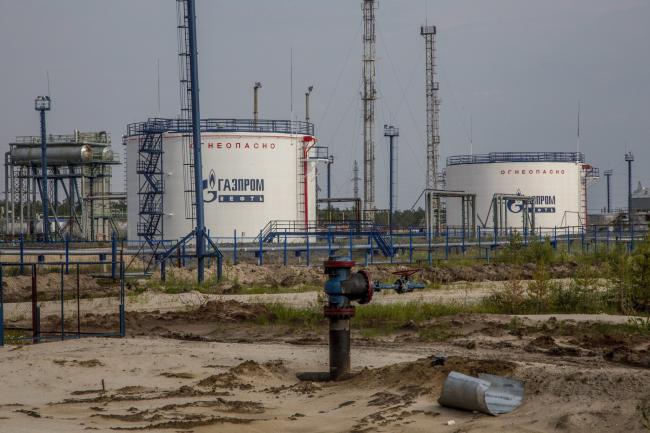Articles Menu

Mar. 2, 2022
Canadian banks, insurance companies and asset managers have pumped millions into Russian-owned oil and gas companies that have flowed into the petrostate’s war chest.
New research from international climate non-profit Stand.earth shows Manulife, RBC, CIBC, BMO and others have collectively financed Russia’s three largest oil and gas companies — Gazprom, Lukoil and Rosneft — with more than US$110 million worth of investments. The data was compiled using financial software called a Bloomberg terminal that tracks investments in real-time.
Specifically, Manulife holds $14.7 million worth of stock and about $7 million worth of Gazprom bonds. It owns about $39 million in Lukoil stock and roughly $590,000 worth of bonds. It also holds roughly $5.8 million worth of shares in Rosneft. Together, Manulife’s exposure to the three Russian oil and gas companies adds up to about $67 million, or about 60 per cent of the total investments of identified Canadian financial institutions.
According to the data, RBC owns $6.3 million in shares of Lukoil and over $31 million worth of bonds from Gazprom. Similarly, BMO owns $4.3 million worth of shares as well as $3.3 million worth of bonds in Gazprom. CIBC holds $7.8 million worth of shares in Lukoil and just over $240,000 worth of shares in Rosneft.
Other financial institutions supporting the Russian oil and gas giants include AGF Management, MD Financial Management, Sun Life Financial, Desjardins Trust, Fidelity Investments Canada, 1832 Asset Management and Power Corp of Canada.
Stand.earth climate finance director Richard Brooks told Canada’s National Observer that even if the total figures aren’t enough to fundamentally change the calculus of the invasion of Ukraine, these institutions should divest themselves as part of the Canadian response to Russia, from symbolic actions — like lighting up the CN Tower in Ukraine’s colours to other economic tactics like sanctions.
“The investment isn't in the billions of dollars, but that doesn't mean Canadian financial institutions are off the hook in terms of taking responsibility for where their money is being invested and what kind of activities their money is supporting,” he said.
“If Vladimir Putin didn't have Russian oil and gas revenue, then he wouldn't have been able to amass the war chest that he has to be able to invade Ukraine,” he added.

Russia is a fossil fuel energy superpower. Its energy policies often dovetail with its foreign policies given how significant fossil fuel exports are to the country’s economy. Oil and gas made up 60 per cent of exports and nearly 40 per cent of the country’s revenue in 2019. The country reportedly receives upwards of $500 million in revenue every day from oil and gas. The multibillion-dollar Gazprom-owned Nord Stream 2 pipeline, designed to double capacity for natural gas flowing from Russia to Germany via the Black Sea, is just one example of how Putin has been able to leverage European energy needs to Russia’s advantage.
Canadian financial institutions are pumping millions into Russia's war chest via oil and gas investments. Pressure is mounting to divest. #cdnpoli - Twitter
Brooks said the ongoing invasion of Ukraine underscores how financing fossil fuels carries risks for more than just the climate, noting: “Geopolitics are what they are because of the energy industry, to a large degree.”
“We wouldn't be in this situation if we had begun the transition to renewables and off of fossil fuels 20 years ago,” he said. “Many European countries wouldn’t be beholden to Russian oil and gas if that transition had already happened.”
Countries are waking up to this. On Monday, The Associated Press reported Germany’s vice-chancellor would travel to Washington to discuss ramping up renewable energy to achieve better energy security.
Despite the security benefits of decarbonizing, Big Oil boosters in Canada, including the Canadian Association of Petroleum Producers, Alberta Premier Jason Kenney and some Conservative Party MPs, have called on ramping up domestic fossil fuel production.
“I think that's just despicable that they would try to use this crisis to drive an expansion of oil and gas production and exploration in North America. That's exactly what we should not be doing,” Brooks said.
“We need to put investments into renewables and get off fossil fuels because in the end, nobody controls the wind and nobody controls the sun,” he said. “And when nobody has control over those two fuels, that changes the whole geopolitical system globally and could go a long way to preventing this type of thing from happening again.”

Part of the international response against Russia is to sanction key elements of its economy. That’s why the U.S. slapped sanctions on Nord Stream 2 last week, and Reuters reports the company is now considering filing for insolvency given sanctions are only expected to tighten. Many Russian banks have been cut off from SWIFT, the plumbing of the global financial system.
Western oil and gas giants are also starting to distance themselves. On Sunday, after decades of working in Russia, BP announced it would divest itself of its 19.75 per cent stake in Rosneft, potentially costing BP $25 billion. Similarly, Shell said on Monday it would exit all of its Russian operations, including the Nord Stream 2 pipeline and the Sakhalin 2 LNG plant, where it holds a 27.5 per cent stake, and where Gazprom is a 50 per cent owner.
Stand.earth is calling for Ottawa to require Canadian companies to divest from Russian-owned companies in an expected next round of sanctions.
The federal government, Manulife, RBC, BMO, and CIBC did not return a request for comment by deadline.
[Top photo: A Gazprom oil-producing facility in Russia's Yamal region. Canadian banks and insurance companies have invested millions in the country's oil and gas companies, which make up nearly 40 per cent of Russia's revenue. (AP Photo/Petr Shelomovskiy)]